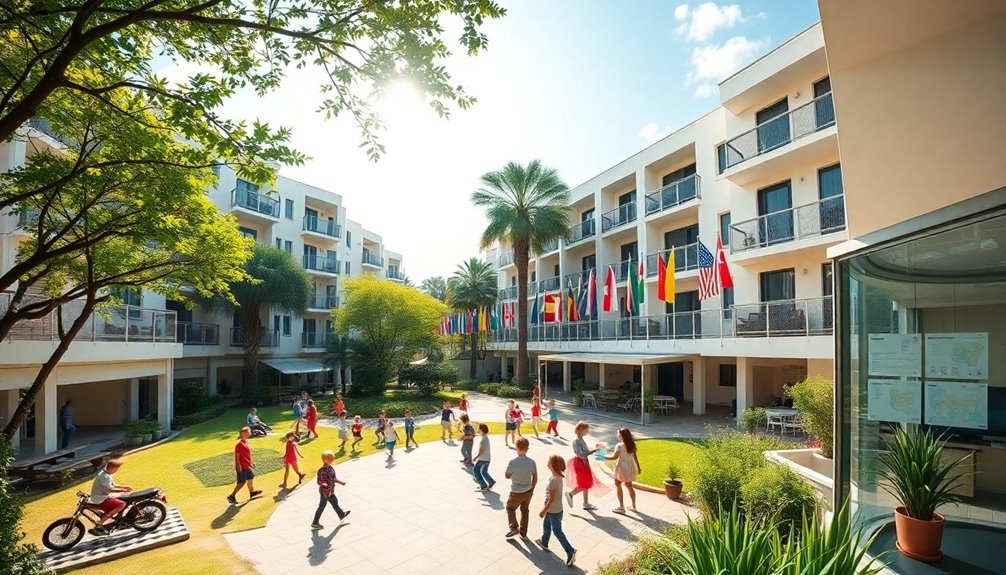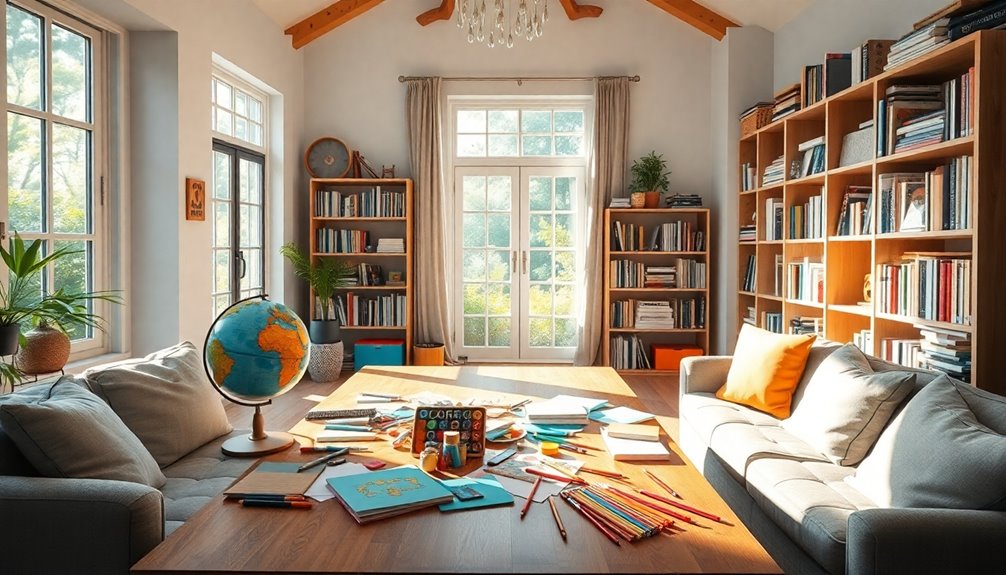When choosing education options near popular expat property markets, you have several paths. Local schools offer cultural immersion, while private international schools provide continuity with familiar curricula. Local private schools can be more affordable without sacrificing quality. Consider factors like curriculum quality, class size, and teacher qualifications when selecting a school. Also, keep financial implications in mind, such as tuition fees and additional costs. Engaging with expat families can give you valuable insights into school options. Explore the unique education landscape, and you’ll discover the best solutions for your family’s needs. Additionally, when considering education options near popular expat property markets, it’s important to also take into account rental income opportunities. Some families purchase property with the intention of renting it out when they are not using it, which can help offset the cost of education and other expenses. It’s worth researching the rental market and speaking with local real estate professionals to understand the potential for rental income in the area. By considering both education and rental income opportunities, you can make a well-informed decision about where to invest in property.
Key Takeaways
- Local schools offer cultural immersion and language practice, enhancing children's adaptation in popular expat markets.
- Private international schools provide continuity with U.S. curricula, ideal for families relocating frequently.
- Local private schools are often more affordable while maintaining quality education, especially in regions like Latin America and South Africa.
- Homeschooling and flexi schooling options can be tailored to meet individual family needs while navigating local education systems.
- Networking with expat families helps gather insights on school quality, available scholarships, and community integration opportunities.
Understanding School Options

When maneuvering through the maze of educational choices, expat families find themselves weighing various school options that cater to their unique needs.
You'll encounter local schools, which offer cultural immersion and language practice, providing a rich experience for your children. Alternatively, private international schools often follow U.S. curricula, ensuring familiarity and continuity in education, especially during frequent relocations.
If you're budget-conscious, consider local private schools, as they may deliver high-quality education at a lower cost than international schools, particularly in regions like Latin America and South Africa.
For more flexibility, homeschooling allows you to tailor your child's education, although it does require discipline and can limit social interactions.
When exploring these options, pay close attention to the accreditation status of each school. Recognized accreditations can make changes smoother for your children, whether they're moving between schools or preparing for college applications.
Key Factors for Selection

Choosing the right school for your expat children hinges on several key factors that can considerably shape their educational journey. As an expat family, you'll want to prioritize aspects like curriculum quality, teacher qualifications, and class size—these elements directly impact your children's learning experience.
| Factor | Importance |
|---|---|
| Curriculum Quality | Guarantees a solid educational foundation |
| Teacher Qualifications | Affects teaching effectiveness |
| Class Size | Influences individual attention and support |
| Language Support Services | Aids non-native speakers in adapting |
| Extracurricular Activities | Enhances social integration and friendships |
Furthermore, when considering private schools, check their accreditation status. This status guarantees that the institution meets recognized educational standards, easing your children's shift to other schools or even back to the U.S. In addition, proximity to quality international schools can elevate property values, making homes near these institutions more desirable in popular expat markets. By focusing on these key factors, you'll set your children up for a successful and fulfilling educational experience abroad.
Importance of Accreditations

Accreditations play an essential role in ensuring your children's educational experience abroad meets recognized standards. For expat students, understanding the accreditation status of international schools is fundamental for maintaining educational quality and facilitating future school transfers.
Here are three key reasons why you should prioritize accreditation:
- Future Transfers: Confirmed accreditations simplify the process of shifting between schools, ensuring your child's academic record is recognized elsewhere.
- College Opportunities: Many universities require a certain level of accreditation for admission. Knowing your child's school is accredited enhances their chances of acceptance into reputable colleges.
- Quality Assurance: Utilizing resources like the Council of International Schools and the CHEA database can help you verify the educational quality of international schools, ensuring they meet acceptable standards.
Direct contact with schools to confirm their accreditation, especially for U.S. schools, is essential for maintaining educational continuity and ensuring eligibility for FAFSA.
Investigating accreditation through the International Network for Quality Assurance Agencies also provides additional insights into schools' credibility.
Insights From Other Expats

Finding the right educational path for your children often means looking beyond accreditation alone. Many expats share that local schools can greatly enhance cultural integration while providing essential language immersion opportunities.
Connecting with other expat families in your area can give you invaluable insights into the quality and reputation of both international and local school options.
Joining social media groups focused on expat life is another excellent way to gather advice about schooling. You'll discover hidden gems and potential pitfalls in the local education systems.
Feedback from fellow expats indicates that visiting schools and talking directly with teachers and administrators often reveals more about the environment and educational quality than official ratings ever could.
Additionally, expat communities frequently swap information about scholarships or financial aid opportunities available at both international and local schools. This can help you manage educational costs while ensuring your children receive a high-quality education.
Professional Educational Guidance

When traversing the educational landscape as an expat, professional educational guidance can be a game changer for your family. Tailored advice from experts can help you navigate the complexities of local education systems, ensuring that your expat children receive the best possible education.
Here's how professional guidance can support you:
- Personalized Insights: Advisors can evaluate various schooling options based on your family's unique needs and preferences, helping you find the right fit for your children.
- Informed Decision-Making: Access to extensive resources and information allows you to explore multiple educational pathways, ensuring you're well-equipped to make informed choices.
- Stress Reduction: Engaging with professionals in expatriate education alleviates the stress of relocating and adapting to new academic environments, making the change smoother for your family.
Utilizing professional educational guidance not only enhances the likelihood of securing quality education options for your expat children but also aligns with your long-term academic and personal goals.
Financial Considerations

Maneuvering the financial landscape of expat education can be challenging, but understanding the costs involved is essential for budgeting effectively. Tuition fees for international schools can soar over $20,000 annually, while local private schools often provide quality education at more affordable rates.
It's vital to research the options available in your area to make informed decisions.
Don't forget to factor in additional education expenses, such as transportation, books, and school supplies, which can add another 10-15% to your total annual costs. Many schools offer financial aid and scholarships, which can greatly ease the financial burden, especially in high-cost regions.
When budgeting, also consider the tax implications of using 529 education savings accounts abroad. These accounts might be treated as ordinary taxable accounts outside the U.S., which could affect your overall financial strategy.
Finally, keep an eye on fluctuating currency exchange rates, as they can impact tuition fees and other education expenses when paid in local currencies.
Supporting Emotional Well-Being

Supporting your child's emotional well-being during an expat move requires proactive involvement and understanding.
As you navigate this change, focus on fostering resilience and connection. Here are three effective strategies to support your expat children:
1. Encourage Open Communication****: Talk to your kids about the move and the feelings that come with it.
By addressing their concerns, you help them feel secure and validated.
2. Get Involved in Local Clubs****: Encourage your children to join local clubs or sports teams.
These activities create opportunities to make new friends and integrate into the community, enhancing their emotional well-being.
3. Participate in Community Events****: Engage in local community events that celebrate your home culture.
This connection to familiar traditions can instill a sense of belonging amidst the changes.
Transitioning to a New Culture

Adapting to a new culture can feel overwhelming, but understanding the local customs and social norms makes the process smoother. For families living abroad, researching the local culture is vital for effective acclimatization. It helps you navigate your new environment with greater ease and confidence.
Learning the local language can be a game-changer, enhancing your communication skills and fostering deeper connections within the community. Consider enrolling in language classes or participating in local immersion experiences.
Building a support network with other expats can also provide invaluable emotional assistance and practical tips during this shift. Such relationships can make adapting to a new culture feel less isolating.
Involving your children in discussions about the move can ease their emotional adjustments, making them feel more secure and engaged in the process.
Participating in local activities, like clubs or sports teams, encourages cultural integration and helps form friendships, which are essential for a successful adjustment.
Explore education options that align with your family's needs, as these can provide additional support during your journey into a new culture. Embrace the change, and soon, you'll find yourself feeling at home in your new environment. Additionally, adopting stress management techniques can significantly aid in maintaining emotional balance during this transition.
Homeschooling Alternatives

While maneuvering the complexities of expat life, many families are exploring homeschooling alternatives as a flexible education option.
With over 50,000 children in the UK engaged in home education, it's clear that this choice is gaining traction.
If you're considering this route, here are three popular options:
- Homeschooling: You can create a tailored curriculum that meets your child's needs, guaranteeing a personalized learning experience.
- Flexi Schooling: This approach combines part-time homeschooling with traditional schooling, providing flexibility to balance both worlds effectively.
- Customized Homeschooling: Particularly beneficial for children with special education needs (SEN), these programs confirm that learning is adapted to your child's unique requirements.
Before diving in, remember to research the legal requirements for homeschooling in your country.
Engaging with your local education authority is essential, as rules can vary considerably by region.
This knowledge will help you navigate the regulations and guarantee a smooth changeover for your family.
Frequently Asked Questions
What Are the Language Requirements for Local Schools?
Language requirements for local schools often depend on the country and region.
You'll typically find that schools expect proficiency in the local language, especially for younger students.
Some international schools offer bilingual or English-language programs, which might ease your shift.
Be prepared to provide proof of language skills or take an assessment.
It's best to research specific schools to understand their requirements and support systems for non-native speakers.
How Do School Holidays Differ Between Local and International Schools?
School holidays can vary considerably between local and international schools.
Typically, local schools follow national holidays and have longer summer breaks, while international schools often align their calendar with their home country's schedule.
You might find that local schools have shorter breaks throughout the year, while international schools may offer more frequent, but shorter, vacations.
It's crucial to check each school's specific calendar to plan your family's schedule effectively.
What Extracurricular Activities Are Typically Available?
Extracurricular activities often vary widely, but you'll typically find options like sports, arts, music, and drama.
Many schools offer clubs focused on science, technology, or languages, allowing you to explore your interests further.
You might also encounter community service programs, which help develop a sense of responsibility.
Make sure to check with local schools to see what specific activities they provide, as this can enhance your overall educational experience.
How Can I Assess the Quality of a School?
To assess the quality of a school, start by researching its accreditation and reputation.
Visit the school's website to review their curriculum and extracurricular offerings. Talk to parents and students for firsthand insights.
Check out online reviews and ratings, but consider the source. Ultimately, visiting the school can give you a feel for the environment and culture.
Trust your instincts—if it feels right, it might be a great fit for you.
Are There Support Services for Children With Special Needs?
When it comes to support services for children with special needs, you'll find a variety of options available.
Many schools offer specialized programs that cater to individual learning requirements. You should inquire about their resources, like speech therapy or counseling, which can make a significant difference in your child's development.
After all, every child deserves the right support to thrive, don't they?
Conclusion
Charting education options in popular expat markets can feel like wandering through a maze, but with the right guidance, you can find the best path for your child. By considering factors like accreditations, emotional well-being, and cultural changes, you'll set them up for success. Remember, you're not alone in this journey—many expats have walked the same road. Embrace the adventure and make informed choices that will help your family thrive in a new environment.









